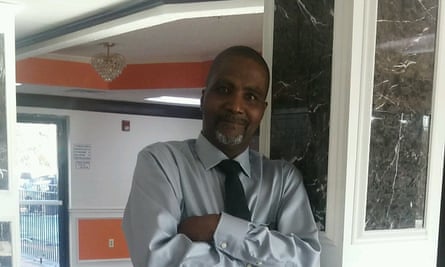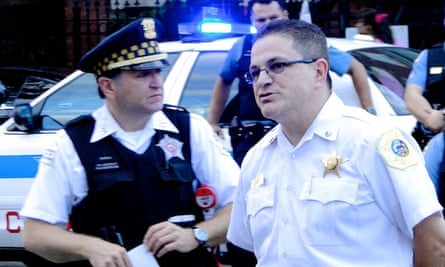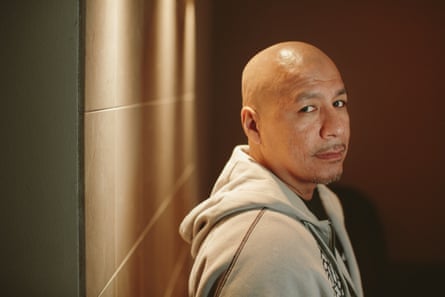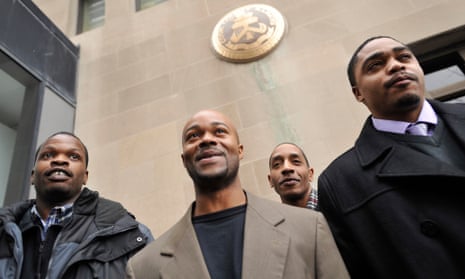On a breezy June evening in 1995, twenty years before the fatal police shooting of 17-year-old Laquan McDonald would envelop Chicago in scandal, Derrick Flewellen hobbled into St Bernard’s Hospital on the south side of the city, seeking care for an open wound on his right foot. As the night progressed and Flewellen’s girlfriend kept him company, the 31-year-old was treated with antibiotics and pain medicine before being bandaged up and discharged around 2am the next morning.
But soon after his departure from the hospital, Flewellen would again be in pain. Two Chicago police detectives, Francis Valadez and Steve Buglio, had arrived to St Bernard’s in search of Flewellen and allegedly intimidated the couple into heading straight to violent crimes unit headquarters from the hospital, for questioning. According to testimony from the criminal trial that eventually saw Flewellen’s acquittal for two murder charges, based on DNA evidence, he was heard screaming from inside a police interrogation room, in the hours that followed, after Valadez – now one of 22 district commanders leading the Chicago Police force – stomped on Flewellen’s injured foot and proceeded to crush the wheels of a metal chair into his wounds.
In all, Flewellen says in his lawsuit that seven detectives beat him over the course of 36 hours, ignoring his pleas for a lawyer, sleep and pain medication while threatening that the department of children and family services would take his girlfriend’s infant son away from her. Following the barrage, he “confessed”.
“My life totally changed,” said Flewellen, speaking to the Guardian by phone from the Chicago suburb where he now lives with his sister. “Being falsely accused of murder and having three, four detectives slapping me around to get a confession … It wasn’t pretty, I got beat up, tortured. I have been beaten up by inmates, I’ve been beaten up by Cook County sheriff’s police. I almost got stabbed in there after they posted my picture on the news.”

Unable to afford bond, Flewellen languished for four and a half years in Cook County jail before a judge would find him not guilty, even after each of the officers who interrogated Flewellen testified against him. Six months after he was set free, Flewellen filed a civil complaint against the detectives. Although the officers denied his accusations, the City of Chicago eventually settled Flewellen’s claims of false arrest and malicious prosecution for $250,000 in 2002.
Despite the evidence that Flewellen’s confession was false – corroborated further by the assertion of a medical examiner that one of the murders of which he was charged would not have been deemed a homicide absent his statement – five of the detectives who Flewellen said tortured him remain on the force today. Three, in fact, have ascended ranks: Commander Francis Valadez, Lieutenant Luke Kelly and Sergeant Daniel McDonald.
Meanwhile, the repercussions of what transpired that night at the station 20 years ago haunt Flewellen to this day. “Every time I see the police, I’m thinking that they going to stop me,” he said. “I feel like that every day.
“I wouldn’t exactly say it’s over,” he said.
Accused and employed
Unlike Flewellen, Chicago police officers accused of coercing confessions from black and Latino men in what’s now known as the Jon Burge torture scandal have yet to face criminal charges, save one. Burge, who commanded a crew of detectives who used electric shock, suffocation and mock executions to coerce confessions of more than 120 men from the 1970s through the early 90s, escaped prosecution for the worst of the charges leveled against him, given a statute of limitations. Eventually convicted on obstruction of justice and perjury, he served three and half years in prison and continues to collect his pension.
The city purported to address the victims of Burge’s torture with precedent-setting reparations paid to 57 victims of Chicago police torture at the start of 2016. The result of an international human rights campaign, Chicago’s reparations legislation passed in May 2015 with a vow from the city’s mayor, Rahm Emanuel, that Chicago would “confront its past and come to terms with it”.
But Burge wasn’t the only Chicago police officer involved in the decades-long practice of police torture to cost the city millions of dollars in settlements and come out virtually unscathed – as the records of Flewellen’s arresting detectives show. According to US state’s attorney Patrick Fitzgerald, whose office brought charges against Burge, no other Chicago police officers implicated in the torture scandal have been charged to date.
A five-month investigation by the Guardian reveals that officers Francis Valadez, John Halloran, Steve Buglio, Luke Kelly and Daniel McDonald have cumulatively been accused of coercing at least 11 false confessions for murder – by men who have each been exonerated, acquitted or had their criminal charges thrown out. After spending a collective 110 years behind bars, eight of the men, and the estate of one man since deceased, have filed civil complaints against the officers. With half of the lawsuits still unfolding in civil court, the cases have resulted in $7.8m in settlements thus far.
The officers’ cumulative annual salaries amount to nearly $600,000. Since January of 2012, they have also earned more than $373,000 in additional, overtime pay collectively.
Spokespeople with the city of Chicago’s department of law and the office of the mayor did not offer comment after 10 detailed requests.
Chicago has been at the center of the mounting scandal of police misuse of force in America since the release of the now-infamous video showing the police killing of 17-year-old Laquan McDonald. But as Mayor Rahm Emanuel faces calls for resignation against the backdrop of a long-sought Department of Justice investigation into the Chicago police department, the records and high ranks of the officers investigated by the Guardian illustrate the deeply unresolved nature of the city’s police scandals past.
In stark contrast with Emanuel’s post-reparations promise, the continued employment of officers implicated in the torture scandal, with records bearing patterns of alleged coercion and violent misconduct, signifies a high level of tolerance for corruption and brutality in the force, according to Deborah Jacobs, a law enforcement expert and former executive director of the New Jersey chapter of the American Civil Liberties Union. “Patterns tell you that you have a bad orchard, not just a bad apple,” she said.
A litany of awards – and violence
Commander Francis Valadez, the highest ranking among the five former violent crimes unit detectives accused of torturing Flewellen, was designated a hero by top brass and local media early in his career.
A born-and-raised Chicagoan, Valadez has garnered 131 awards across three decades on the force, according to Chicago Police News Affairs – a time in which he has also fatally shot four people.
In 1994, Valadez received the prestigious Lambert Tree award, granted to a single Chicago police officer annually, after winning recognition as a runner-up the year prior. Nominated in 1993 for actions deemed heroic by the department in the killing of 19-year-old Willie Matlock, Valadez shot the black teen five times, according to the medical examiner’s autopsy report, after Matlock allegedly attempted to steal the off-duty officer’s car at gunpoint, while his toddler son sat in the backseat.
Valadez then took home the department’s highest award for bravery in 1994, the same year he shot and killed black 18-year-old Xavier Robertson. “Hero Cop Makes It 2 In Row”, read the Chicago Tribune’s headline.
But Valadez’s most notable commendation was yet to come. On 5 February 2005, Chicago city council members voted unanimously in favor of a congratulatory resolution introduced by then mayor Richard M Daley, honoring the “exemplary conduct” of Valadez and two additional shooting officers in the killing of Byron Logan, a 24-year-old black man from the west side of Chicago who was shot 10 times, according to the Cook County medical examiner’s autopsy report that described wounds to the back of Logan’s head, lower back and limbs. Most notable among the roster of favorable voters: Cook County board president Toni Preckwinkle, who recently decried to media that “the police in Chicago could shoot, could execute black and brown people without consequence”. Questioned on her vote to award a fatal police shooting, a spokesperson for Preckwinkle’s office told the Guardian that the former alderman was “following a longstanding council tradition”.
While the Chicago police department trumpeted the number of Valadez’s awards to local media upon his promotions in 2012 and 2014, spokesperson Anthony Guglielmi said he could not provide details or answer questions about any of the awards. Via city lawyers and police officials, Valadez declined to comment after 16 requests from the Guardian, while a Freedom of Information Act request to obtain records on a misconduct complaint lodged against the officer, by an unnamed black female civilian in 2013, has gone unfulfilled. That complaint relates to Valadez’s alleged conduct at Homan Square, a secret Chicago police facility revealed by the Guardian and plagued by accusations of abuse.
Throughout his years on the force, Valadez has been accused of battery, assault and helping to coerce six false murder confessions.
Thirteen years after Flewellen won his settlement from the city, the same Valadez who had allegedly stomped on his injured foot is now accused of helping to coerce the confessions of four other exonerees known as the Englewood Four. Aged 15 to 18 at the time of their imprisonment in 1995, Harold Richardson, Michael Saunders, Terrill Swift and Vincent Thames exited as grown men in 2012 with certificates of innocence in hand. Like Flewellen, they were exonerated by DNA evidence.
Convicted for the rape and murder of Nina Glover, the black teens were each brought to the police station, interrogated and ultimately confessed – following the two-day interrogation of a fifth teen, Jerry Fincher, who implicated them. According to each of the exonerees’ lawsuits, Valadez fed details about the crime to Fincher, who was kept in handcuffs, threatened with violence and imprisonment, and beaten.

In between the Englewood Four’s arrest and release in July 2004, five months after Valadez received the plaudits of city council, he allegedly beat a black man named Anthony Scott on the north side of Chicago. The city of Chicago settled Scott’s charges of assault and battery in 2007 for $3,000 – a drop in the bucket in a year in which the city’s payouts to four former death row inmates, tortured by Jon Burge and his subordinates, amounted to $20m.
On shootings and torture
Now one of 22 district commanders currently leading the Chicago police force, Valadez presides over the 10th district on the city’s south-west side, where he most recently fired on 29-year-old Rafael Cruz Jr alongside an unnamed officer on 29 August 2015. Cruz was pronounced dead on the scene, from a single bullet to the back.
After describing the death as “unfortunate”, former police superintendent Garry McCarthy praised Valadez at a press conference the following day. But as the Chicago Sun Times reported, the shooting appears to have been at odds with a revision to departmental policy by McCarthy months prior, forbidding shooting at a fleeing car, as Valadez and the unnamed officer did in firing on Cruz.
The Independent Police Review Authority (IPRA), which investigates whether officer-involved shootings violated department policy, declined to comment on the Cruz case because it’s still pending.
Although it is not in dispute that one of the police officers fired the fatal shot that killed Cruz, Cook County state’s attorney Anita Alvarez has charged another civilian, Erik Martinez, with first degree murder for his death, under a controversial legal doctrine known as the felony murder rule. After allegedly exchanging non-fatal gunfire with Cruz’s vehicle before the police arrived, “Martinez set the entire series of events into motion”, Sally Daly, director of communications for Alvarez’s office, told the Guardian, making him “legally responsible” for Cruz’s shooting death under Illinois law.

The killing represents the fourth time in Valadez’s career that he has been involved in a shooting death – fitting a national trend identified by the Washington Post that one in eight officers involved in fatal shootings in 2014 had previously killed civilians.
And in Valadez’s particular case, a combination of mounting awards and multiple shootings should come as no surprise, according to Art Lurigio, a master researcher at Loyola University Chicago, who has been studying crime and criminal justice for the past 35 years, frequently alongside Richard Greenleaf, a retired police officer. “Rewards always increase behavior. We have very few laws in psychology and that’s one of them,” he said.
Added Jacobs: “When officers see other officers’ misconduct tolerated – or even rewarded – it not only sends a message that brutal misconduct is allowed, but that it’s the only way to succeed or survive within the department’s culture.”
‘We have to make a change’
While government officials point to the promise of reform following the US Department of Justice’s investigation into the Chicago police department, and new Emanuel-appointed figureheads take the reins of existing city organizations tasked with accountability, Lurigio warns that Chicagoans are facing a 10- to 15-year process for federal oversight to fundamentally transform Chicago police practices, pointing to the years-long process of DoJ-led change at the Los Angeles police department.
“It’s difficult to change institutions,” Lurigio said. “They are like very powerful rubber bands. You can stretch them, but they’ll bounce right back. You have to stretch long enough so they can’t go back.”
But in an era that has seen the rise of the Black Lives Matter movement, change has come rapidly from Chicago’s streets. After years of languishing calls for reform, it is grassroots activists who were credited with pushing through legislation providing reparations to victims of Chicago police torture on a wave of mounting outcry, in May of 2015.
“Chicago made history with the reparations ordinance – this was a win,” said Janaé Bonsu, a PhD candidate studying social work in Chicago and national policy director for the Black Youth Project.
But there are many with credible false confession claims who are not eligible for relief under the current law, because of significant limits in time and scope. Among them is Nick Escamilla, who says he was coerced into a false confession in 1993 by Chicago police violent crimes unit detectives, including John Halloran who remains on the force today.

With the forthcoming Agenda to Build Black Futures, a sweeping economic justice platform to be released 1 February, the Black Youth Project will be calling for expanded reparations both in Chicago and nationwide that might help people such as Escamilla.
His mother, Bertha Escamilla, has placed her hopes in the local campaign to establish a Civilian Police Accountability Council (CPAC) to provide meaningful oversight of officers such as Commander Valadez and those who interrogated her son, Derrick Flewellen and the Englewood Four.
With a wealth of data illustrating that more than 95% of misconduct allegations lodged against the department’s 12,000 members are deemed unsubstantiated, CPAC seeks to form a council of community members elected from each Chicago police district, empowered to penalize and fire officers for misconduct.
“We have to get these people who are appointed officials ... who have any involvement with the police out,” said Escamilla. “Because they’re not doing anything. When something happens to someone, they might settle with an individual but nothing happens to the police,” she said, pointing to those officers who have remained on the force despite millions of dollars in city of Chicago payments to settle accusations of serious misconduct.
“Police are still out here doing the same damn thing and so are the attorneys and judges,” she said. “How has anything changed?”
This report was published in collaboration with City Bureau, a Chicago-based journalism lab

Comments (…)
Sign in or create your Guardian account to join the discussion